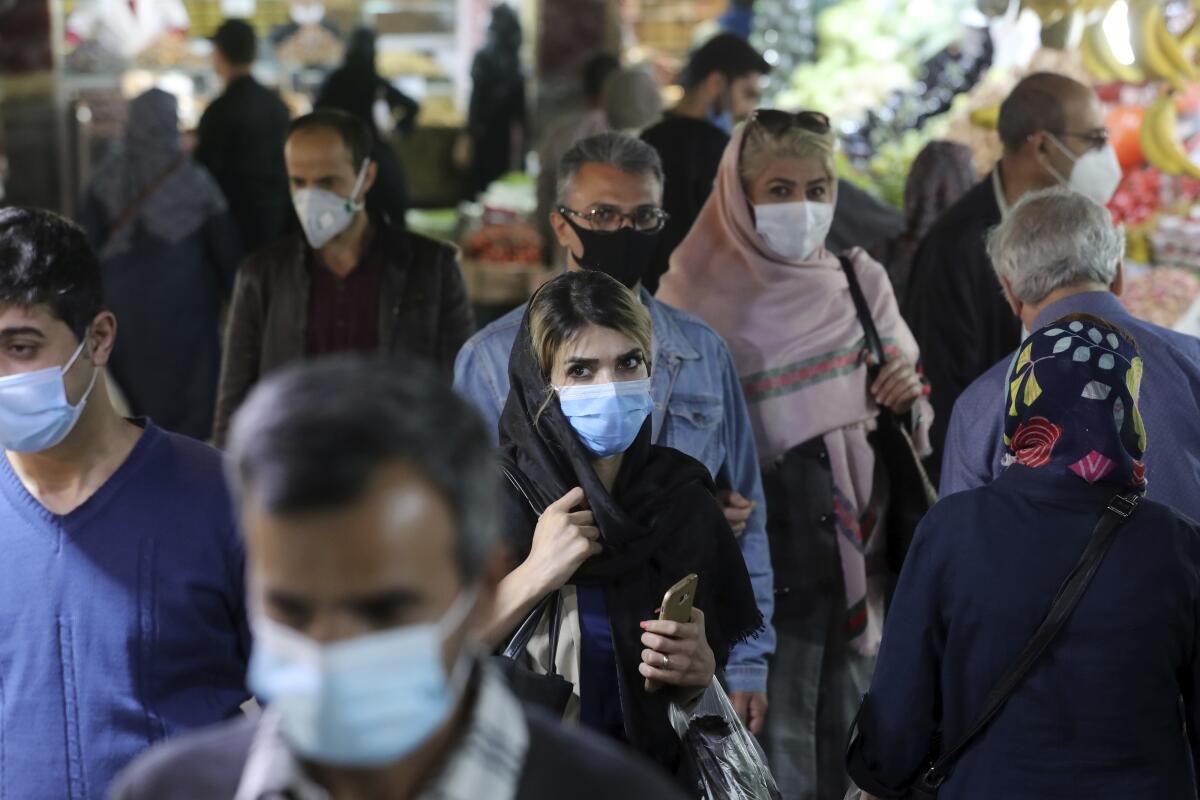Op-Ed: Lift U.S. sanctions that block Iran from buying COVID vaccines

- Share via
The Islamic Republic of Iran has been a recurring problem for every American administration since 1979. Seeing how previous administrations’ policies failed, every new administration has wrestled with how to confront, contain, persuade or negotiate with a country that has remained constantly hostile.
This moment of a global pandemic, however, offers an unusual opportunity for cooperation. Despite their mutual hostility, the two countries today are on the same side of a war against an enemy that has killed more than 347,000 Americans and more than 55,000 Iranians. Unofficial numbers in Iran could be three to four times as high.
Although the Biden administration and the Europeans want to resuscitate the 2015 nuclear agreement, what Iran, the United States and Europe urgently need right now is a COVID deal. The raging pandemic inside Iran combined with factional jockeying for the Iranian presidential election in June have paralyzed its government.
A COVID deal would help rebuild trust for future negotiations with Iran, as well as improve U.S. relations with the European Union, which have weakened in the Trump era. Stopping the pandemic in Iran is essential to protecting Iran’s neighbors, 16 countries constituting over 500 million people. Without vaccines, more Iranians will die, and coronavirus infections from Iran will spread to other countries in the region.
Iranians know their government has botched its response to the pandemic. Like the Trump administration, it publicly denied the seriousness of the virus, ignored the warnings of health officials and encouraged super-spreader events. Now Iranians — like Americans — are paying the price for those misguided policies. In Iran, healthcare workers and doctors are dying in hospitals overwhelmed with COVID patients. The people should not be punished for the actions of their government.
Legally, the shipment of medicines to Iran is not under sanctions today, but the Trump administration has made it impossible for Iran to process payments from its central bank, or receive loans from the International Monetary Fund to pay for them. These financial sanctions have deterred international banks and suppliers of medicine from participating in any financial transactions for fear of becoming subject to secondary U.S. sanctions imposed on their companies or banks.
By issuing broad licenses to medical and pharmaceutical companies and manufacturers of COVID vaccines, the U.S. can assure banks, aid organizations and insurance companies that they will not be punished for supporting humanitarian medical assistance to Iran.
Iran has “pre-purchased” 17 million doses of vaccines through Covax, the COVID-19 Vaccines Global Access Facility, which the World Health Organization created to ensure a more equitable distribution of vaccines. But the sanctions prevent Iran’s central bank from processing the payment for these vaccines. This purchase covers less than 10% of the Iranian population. To fight the virus, Iran has requested an emergency loan from the IMF, which the Trump administration blocked. The U.S. should allow the loan to proceed.
In exchange, the Iranian government should commit to a process that guarantees transparency in the delivery of the vaccines for its population. It should provide accurate case numbers and assessments and allow organizations such as the International Committee of the Red Cross and the World Health Organization to facilitate the distribution of the vaccines inside Iran.
There is precedent for setting aside enmity to address a dire crisis together. After the December 2003 earthquake in Bam, which killed more than 20,000 Iranians, the Bush administration — while making threatening noises about sending tanks to Tehran — sent medical aid to victims. Somehow, the two sides could put aside their distrust to send and accept much-needed help for the survivors.
Today, decades of isolation, recrimination and demonization prevent us from realizing the power of cultural connections that have linked Iran and America for generations. Before the 1979 revolution in Iran, America and Iran enjoyed more than a century of friendship.
If the Biden administration works out a COVID deal that facilitates shipments of vaccines to the Iranian people, it will win over the hearts and minds of millions in that country, strengthening the deep but frayed bonds of friendship between ordinary Americans and Iranians.
John W. Limbert, a former professor of Middle Eastern studies at the U.S. Naval Academy, served as the U.S. deputy assistant secretary of State for Iran and is the author of “Negotiating with Iran: Wrestling the Ghosts of History.” Bahman Baktiari is the executive director of the Baskerville Institute and author of “Parliamentary Politics in Revolutionary Iran.”
More to Read
A cure for the common opinion
Get thought-provoking perspectives with our weekly newsletter.
You may occasionally receive promotional content from the Los Angeles Times.










